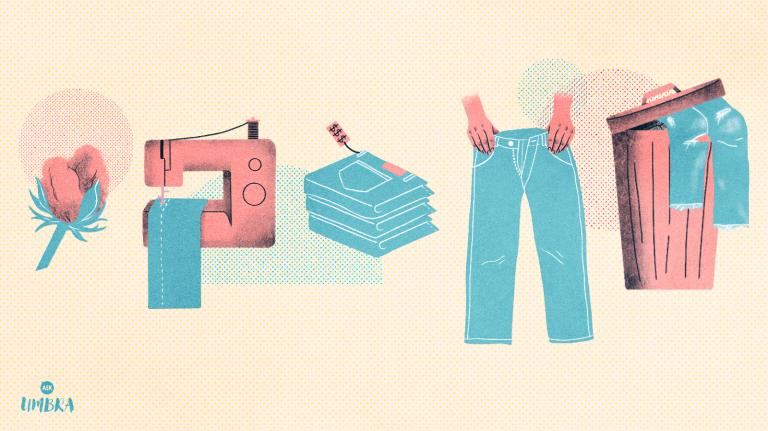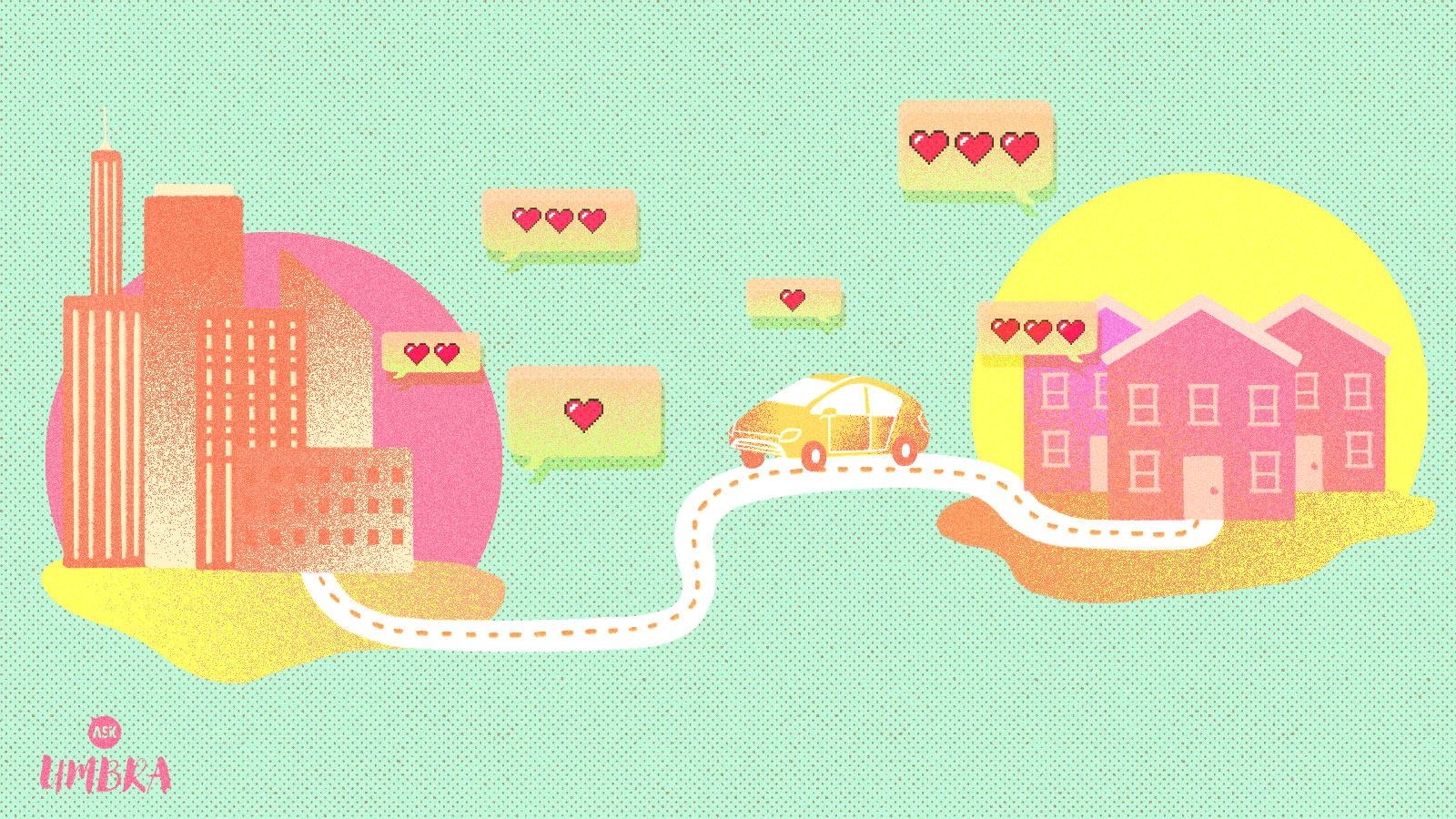Q. Dear Umbra,
I started dating a woman who I met on an app during COVID-19. The relationship requires me to drive several hours every other weekend, which is fine for now, but I feel pretty guilty about all that driving from a climate perspective! But the other thing is, we’ve spent such little time together I’m not sure I really like this person or if I just don’t want to be alone.
— Romance Or Minimized Emissions? Oof
A. Dear ROMEO,
There are so, so, so many unenviable romantic situations to be in during COVID-19. Just every single one seems difficult! My heart certainly goes out to the cohabiting, the married, the forced-into-a-serious-relationship-by-shutdown-order. But the single-and-seeking in particular? Let me speak from experience when I say: Woof!
The very last thing I did before shutdown, a year ago this very week, was an extremely run-of-the-mill tacos-and-margaritas date with someone I’d been seeing in a super casual capacity. He was perfectly nice, but it was clear we had no interest in a serious future together. However, once it sunk in that (1) meeting new people would now constitute both an ethical and medical hazard and (2) I would be very much alone in a studio apartment for the foreseeable future, I started to think: “Maybe this guy is good for me! Perhaps we should weather this storm together and it will bring us closer!”
I didn’t end up acting on that particular misguided, warm body-seeking impulse and neither did he. We didn’t see each other again and probably never will. And as much as the pursuant months were very, very lonely and isolated, I didn’t question that decision. Because — as you reference in your own question — it doesn’t feel good to tie yourself to something that your heart simply isn’t in! It can even make you feel lonelier. And we can find ourselves searching for concrete, rational excuses to leave these tepid relationships, such as, “the gas mileage of this relationship is weighing on my climate conscience.” This dilemma has actually come up in this very column before!
If you are someone who is generally trying to lead a climate-conscious life — as you seem to be, given you’re concerned about the gas expenditures of driving to and from your girlfriend’s home — then you are probably familiar with the sensation of having to choose among several lackluster options. Let’s say there’s no good public transit and/or decent bike infrastructure in your town, so you buy as efficient a hybrid car as you can afford. Problem solved, right? But then you find yourself meticulously weighing the various planetary pros and cons of everything in the grocery aisle. You might even go down the extremely never-ending rabbit hole of what makes a “truly sustainable” purchase.
The more you examine your life, the more you will realize how many compromises — climate and otherwise — we have to make if we are to meet our own modern, human needs. Relationships are no exception. I have also experienced the sinking feeling that there are no good matches out there, and the related downer thought that you’ll eventually have to lower your standards or be alone forever.
And yet, it’s an undeniable fact that there are far more humans than there are net-zero-carbon items — even in a Seattle grocery co-op! And in the age of dating apps, that platitudinous sentiment really is truer than ever before. If you were an economics major examining the situation, you’d note you have many thousands of options at your literal fingertips. That incredible variety theoretically should provide a sort of countercurrent to the desire to simply shack up with the next person who checks enough of your boxes. If the goal of dating is to find the most optimized partner possible, why would you call off the hunt when your best option could be just around the corner?
The entire premise of economics is that humans make rational decisions, which is why economics is an extremely flawed field. An excellent example of this is the realm of ostensibly environmentally-driven decisions, for which there are all kinds of measurable factors you can weigh against each other. Certain variables can be in conflict with each other and their relative values are difficult to estimate, but you could put together a spreadsheet and more or less figure out how one choice empirically compares to another in terms of carbon emissions or water usage or anything in that realm. Climate scientists do it all the time! That’s how we know things, like that red meat has a higher carbon footprint than chicken, and that cotton is a more water-intensive crop than polyester.
And yet, over and over and over again, people will choose with their feelings over facts. You can know that by nearly every climate measure, a cheeseburger is a terrible dietary decision, but you will find a way to rationalize it if your craving for one is strong enough. I get dozens of emails from readers who feel guilty about air travel because they know about its prodigious carbon footprint. Guess what? I guarantee you that no matter what I say, each of those letter-writers will continue to take flights, if it’s to a destination they’ve always dreamed of or to see a person they dearly miss.
Regular readers of this column know that I generally take a pretty easygoing stance when it comes to relatively minor climate sins, because the culpability of your average car commuter is negligible compared to fossil fuel companies, denialist politicians, and the big banks that fund them. We will eventually have to abandon some climate-threatening activities like driving gas-powered cars, and I appreciate that you’re already thinking about that, but it doesn’t really have anything to do with your actual dilemma here. You want to know how you feel about your current partner, and carbon footprints have nothing to do with that.
I’m not berating you: To be clear, I’ve also been in this position. But since we are so inclined to just follow our heart’s desire when it comes to so many other, far less consequential daily choices than potentially choosing a life partner, for crying out loud, it seems insane that there’s such a block for knowing how you feel about someone. Why is it so hard to simply follow one’s feelings when it comes to romantic decisions, the one arena in which it is most advisable to do so?
I think the easiest way to know whether you want someone in your life is to note if you miss them when they’re not. And it seems that you have plenty of opportunity to test this, if your potential person lives a couple of hours away. (I have to say — if you’re even willing to travel this distance, there has to be something appealing about this person!) Do you want to tell them things throughout the day? When you’re alone and want company, do you think of them specifically or do others come to mind? And when you have plans to see this person, do you feel happy anticipation, lukewarm dread, or nothing at all?
My advice to you is to stop trying to measure and weigh and simply feel what you feel. Trust your instincts! And give yourself all the time you need to let those instincts really talk to you!
Relatably,
Umbra




